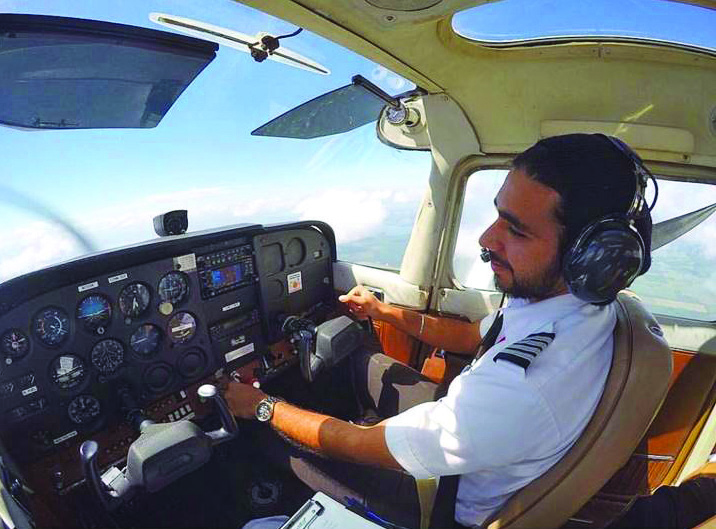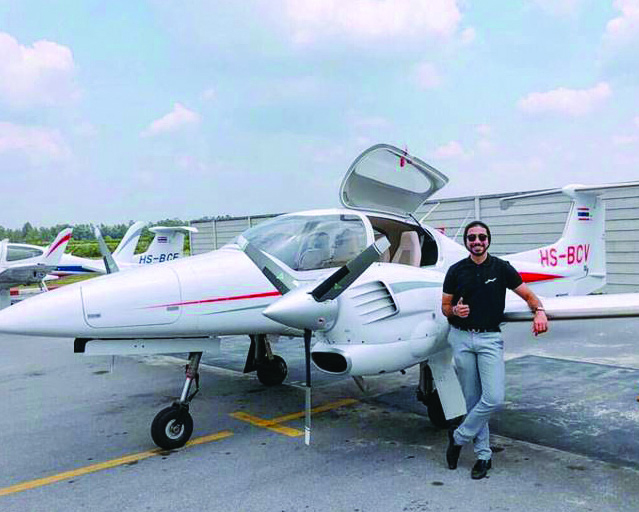Pilot Naveen Singh proves that when it comes to pursuing your passion, the sky is the limit.
By Ashima Sethi
In the pursuit of a thriving career path in aviation, Naveen Singh’s fervent dedication has led to profound success at an early stage. At only 22 years old, the passionate pilot had already gained flight experience in both the United States of America and Thailand. Through his experience, he developed a greater understanding of what it takes to fulfil his role, which he now shares with many cadets as a flight instructor at the Bangkok Aviation Center. However, his inspiring journey of transforming a dream into reality proves that you can’t reach clear skies without a little turbulence.
When did you realise your dream to become a pilot?
I don’t remember a time where I wasn’t fascinated by airplanes, and to be in control of flying one, has always been a dream of mine. At a young age, I didn’t think it was possible to become a pilot because I didn’t personally know anyone who was one, so it never struck me as a possible career choice until much later.
What was the process like to become one?
I completed the training for my pilot license at a flight school called L3 Airline Academy in Orlando, Florida. Afterwards, I was hired by the academy to work as a flight instructor, where I trained cadets of different airlines from around the world for two years. The training process itself was brutal. I remember my first flight instructor telling me that it was going to be the most stressful experience I would ever go through, and I’m not trying to intimidate anyone, but he was right! Although it was extremely difficult, I was lucky enough to make incredible life-long friends, and having a close-knit aviation family was truly a blessing when things got hard.
What were some of the challenges you faced during the training process?
One of the biggest challenges came before I even began any of my training. There were many people who didn’t believe it was possible for a Sikh pilot who wore a turban to enter the aviation industry after the 9/11 attack. However, I proved them wrong when I received a job off er at one of the biggest flight schools in the world. So for anyone out there who has a dream and was told that it might not be possible to fulfil, all you need to do is believe in yourself.
What was it like to transition from a pilot to an instructor?
Whenever I was in a position where I didn’t understand something, or I was having a diffi cult time figuring out a problem, all I had to do was ask my instructor for answers. But to be that person for someone else was extremely nerve-wracking at first. But just like any other job, you become increasingly comfortable with time and experience. As a flight instructor you have an extra responsibility of not only keeping your students safe when you’re flying, but also teaching them how to fly the plane without needing any extra help. It’s quite a task!
What current positions do you hold?
I work as a flight or ground instructor and as a check pilot at the Bangkok Aviation Center, which is recognised as one of the biggest aviation institutions in Southeast Asia. We train pilots for most major airlines based in Thailand, and I occasionally lecture at a few universities as well.
Have you ever received any notable awards or achievements?
When I was a flight instructor in the USA, I understood that my flight record was good. However, I wasn’t sure just how good it was, until I applied to become a check pilot. A check pilot is someone who evaluates a student by observing and quizzing them during a fl ight to see if they meet the required standards. This will determine whether or not the student will receive their license. Needless to say, I was always terrifi ed of check pilots, so when I was selected to attend classes and complete checks at such a young age, I was really honoured.
What was your first flight experience like?
My first flight was with an Air Force pilot in Thailand. I remember being in awe of the entire experience, but at the same time, I really struggled with controlling the aircraft. Everything I learnt on the ground prior to the flight vanished the moment the engine started up. I was completely clueless for most of it, but I definitely loved the view from up there.
What was your most memorable flight?
I once had a student pilot from China who was struggling with landing the plane. He hadn’t trained with me for most of his time at the academy, and he was incredibly close to being terminated from flight school because of his inability to control the aircraft. I was trying to be extra patient with him when he was passed onto me as a student. And after rigorous training, he managed to land a plane all by himself on one of our flights together. Just seeing the happiness on his face was so memorable!
If you could fly to anywhere in the world right now, where would it be?
I could be anywhere! As long as I’m flying the plane and my family is onboard, it would be an absolute dream, as I owe them everything for always believing in me and letting me chase my passions
What do you love most about your profession as a flight instructor?
I love that I get to witness lots of dreams come true. If you ask any pilot how they began their career in aviation, it’s almost like listening to a love story. So to be able to help transform somebody’s dream into reality is what gives me the drive to wake up and enjoy my work every day.
Many people fear flying, so what tips can you provide them with to make them more comfortable in the sky?
Take a flying lesson! Whether you fl y a real aircraft or even a simulator, getting your hands on a plane’s yoke will give you a sense of control. By understanding how a plane really works, and how well-equipped it is to handle all kinds of emergencies, might help ease the anxiety associated with flying.
In your opinion, what qualities make a good pilot?
As a pilot, you really have to know your own abilities and limitations. But in doing so, you should also never allow yourself to become complacent. You have to transform your mindset and become a constant risk evaluator rather than a risk-taker. You should always strive to know more, so never be afraid of asking questions. As Frank Borman, the commander of the Apollo 8 spacefl ight mission once said, “A superior pilot uses his superior judgement to avoid situations that require the use of his superior skills.”
What tips could you give those who aspire to join the aviation industry?
Never give up on your dreams. If you really love the field, then you need to do the research and find a path that best suits you. Training to become a pilot is exhilarating, but it’s also a lot of work. Be prepared to spend many hours reading about fl ight theories, aerodynamics, regulations and systems, along with the many hours practicing in actual aircrafts. Always learn from your mistakes and continue moving forward. Also, your instructor will be the most supportive and demanding figure throughout your training process. Think of them as a positive mentor, because at the end of the day, they too just want you to succeed.
Where do you hope to see yourself in the near future?
I definitely see myself flying for an airline. I am currently a 22-year-old flight instructor, and I believe that my experience will serve me well when I plan on flying passengers all around the world.








